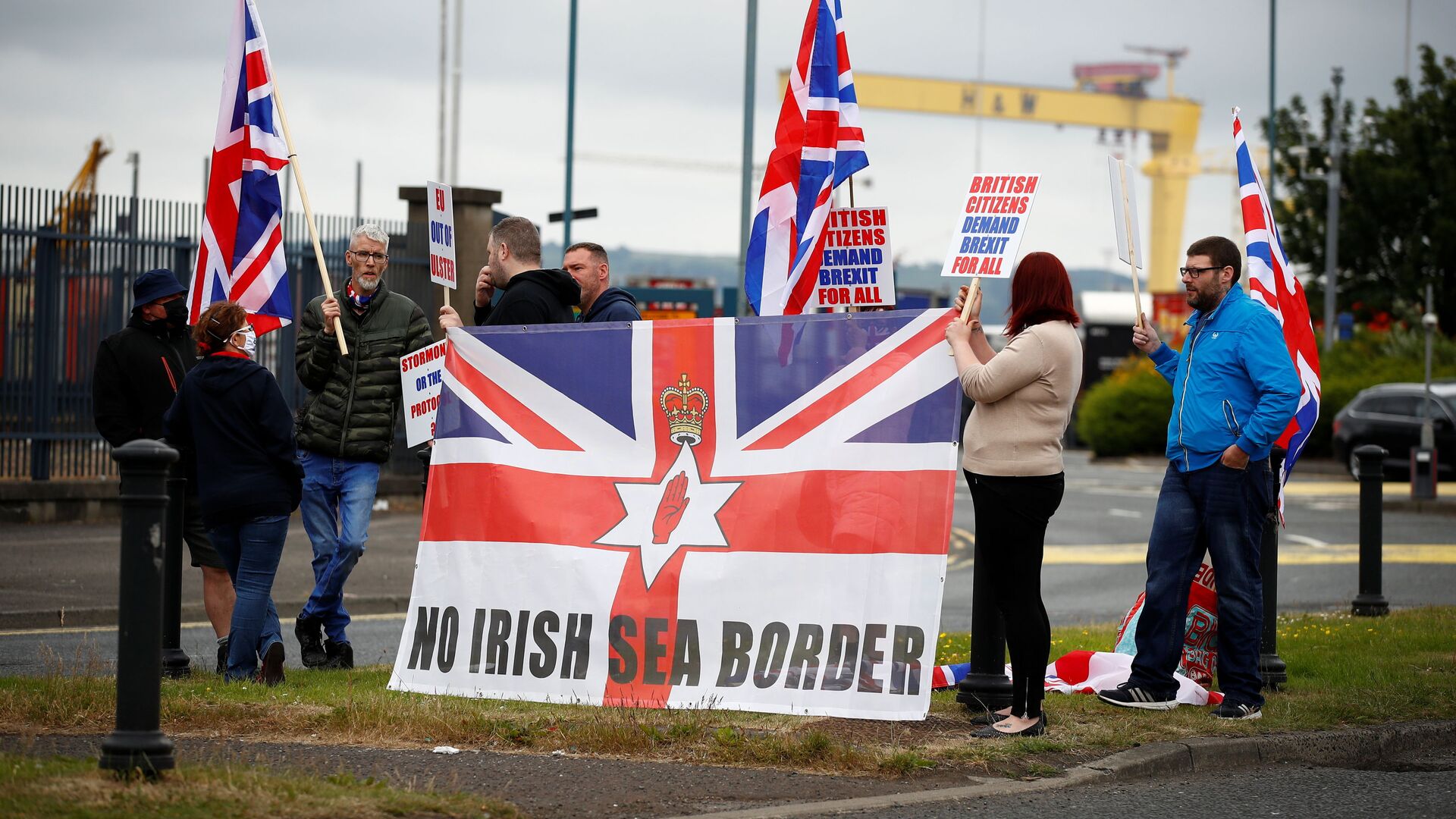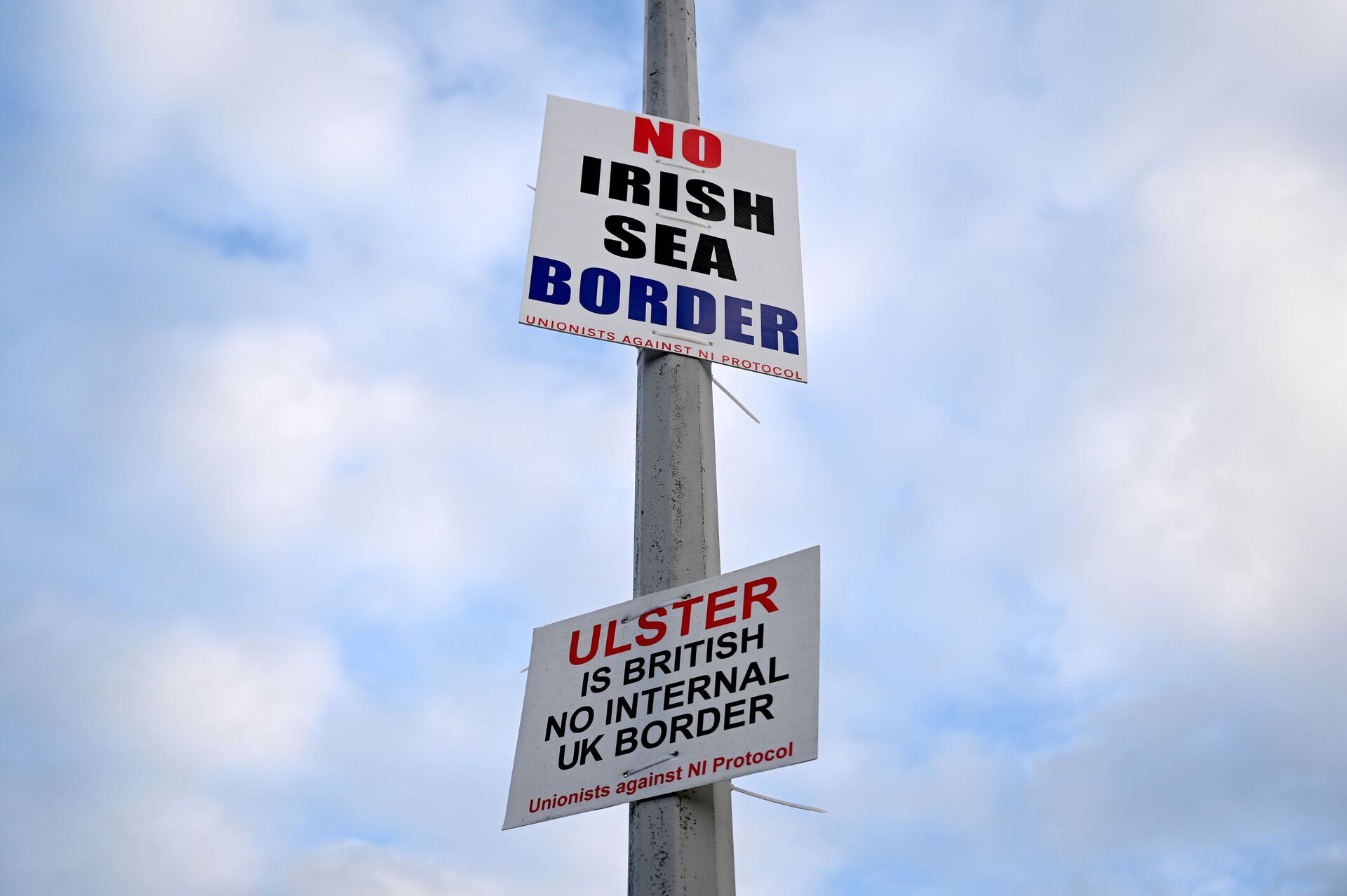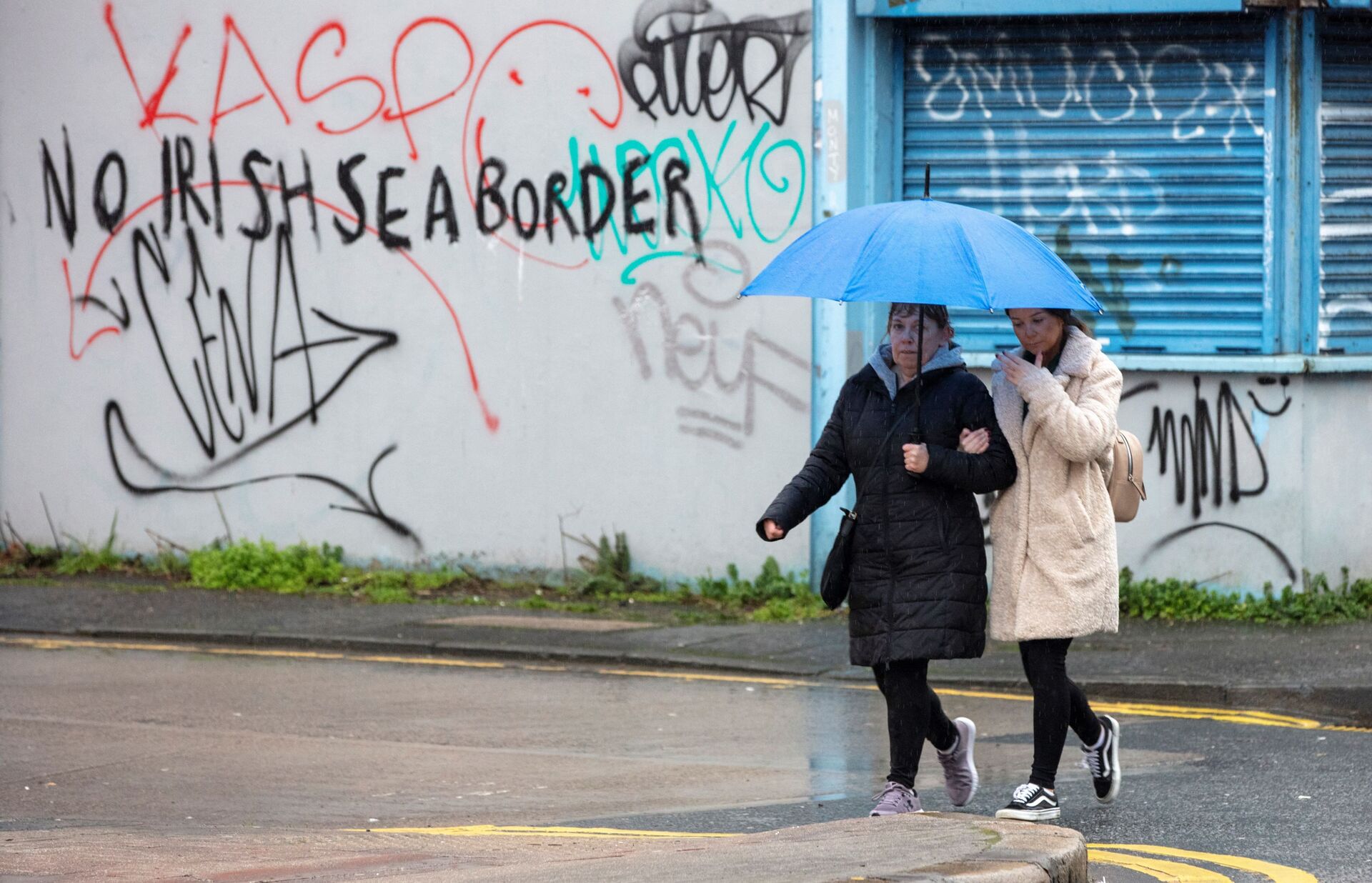https://sputnikglobe.com/20210914/uk-threatens-to-ditch-northern-ireland-protocol-urges-eu-to-start-negotiations-seriously-and-soon-1089056737.html
UK Threatens to Ditch Northern Ireland Protocol, Urges EU to Start Negotiations ‘Seriously and Soon’
UK Threatens to Ditch Northern Ireland Protocol, Urges EU to Start Negotiations ‘Seriously and Soon’
Sputnik International
Earlier, grace periods for post-Brexit checks on some goods entering Northern Ireland, designed to ease the transition into new trading arrangements with the... 14.09.2021, Sputnik International
2021-09-14T09:00+0000
2021-09-14T09:00+0000
2023-05-28T15:35+0000
boris johnson
northern ireland
great britain
maros sefcovic
brexit
northern ireland's democratic unionist party (dup)
david frost
northern ireland protocol
https://cdn1.img.sputnikglobe.com/img/07e5/07/09/1083344380_0:280:3143:2048_1920x0_80_0_0_7c8bcbfb6bc1bb34a2592f751a09a58c.jpg
The UK government has warned the EU that it may unilaterally suspend the so-called Northern Ireland protocol agreed upon by Boris Johnson last December, reported The Guardian. Lord David Frost, the Brexit minister, raised the prospect of triggering “Article 16″ of the protocol, a safeguard clause allowing either side to dispense with applying the protocol if it "leads to serious economic, societal or environmental difficulties that are liable to persist". Frost warned that to avoid the protocol collapsing, there “needs to be a real negotiation between us and the EU.” After the UK exited the European Union, Northern Ireland also effectively left the single market. The Republic of Ireland, meanwhile, remains a part of the European bloc. Under the Northern Ireland Protocol, Britain agreed to leave some EU rules in place in Northern Ireland and accept checks on goods arriving from elsewhere in the UK to preserve an open land border with EU member state Ireland as a key pillar of the peace process there, hailing back to the 1998 Good Friday Agreement.“I was concerned by some of the comments we have heard from commission representatives in recent days which seem to suggest they may be considering this way forward [the take it or leave it approach],” Frost told the House of Lords.UK-EU ‘Chill’ On Saturday the Brexit minister warned of a long-term chill marring UK-EU relations if trading arrangements are not resolved, with “substantial and significant change” to the Northern Ireland Protocol. The Brexit minister was speaking after his Brussels counterpart, European Commission vice president Maros Sefcovic, said that a renegotiation of the protocol would merely lead to more instability.The Brussels official also called upon Northern Ireland’s Democratic Unionist party (DUP) to “dial down the rhetoric” over the Northern Ireland Protocol. The DUP leader Sir Jeffrey Donaldson had threatened his party could collapse Stormont “within weeks” by pulling out ministers from the current power-sharing institutions if changes to Brexit’s Northern Ireland Protocol are not delivered. Sefcovic who went on a two-day visit to Northern Ireland to meet with business leaders and politicians, also reacted to the announcement on Monday by the UK Government that it was extending grace periods on some Irish Sea border checks, saying:Earlier, the UK announced it was extending grace periods on post-Brexit checks on some goods entering Northern Ireland from October 1 "to provide space for potential further discussions" on the contentious Northern Ireland protocol.Grace periods were extended twice before, in March and then again in June, when a ban on the import of chilled meat goods entering Northern Ireland from Great Britain was averted. The EU reacted to the extension, stressing that both sides were "legally bound to fulfil their obligations" under the Brexit deal.
northern ireland
great britain
Sputnik International
feedback@sputniknews.com
+74956456601
MIA „Rossiya Segodnya“
2021
News
en_EN
Sputnik International
feedback@sputniknews.com
+74956456601
MIA „Rossiya Segodnya“
Sputnik International
feedback@sputniknews.com
+74956456601
MIA „Rossiya Segodnya“
boris johnson, northern ireland, great britain, maros sefcovic, brexit, northern ireland's democratic unionist party (dup), david frost, northern ireland protocol
boris johnson, northern ireland, great britain, maros sefcovic, brexit, northern ireland's democratic unionist party (dup), david frost, northern ireland protocol
UK Threatens to Ditch Northern Ireland Protocol, Urges EU to Start Negotiations ‘Seriously and Soon’
09:00 GMT 14.09.2021 (Updated: 15:35 GMT 28.05.2023) Earlier, grace periods for post-Brexit checks on some goods entering Northern Ireland, designed to ease the transition into new trading arrangements with the European bloc, were suspended indefinitely by the UK after negotiations with the EU reached a stalemate.
The UK government has warned the EU that it may unilaterally suspend the so-called Northern Ireland protocol
agreed upon by Boris Johnson last December, reported The Guardian.
Lord David Frost, the Brexit minister, raised the prospect of triggering “Article 16″ of the protocol, a safeguard clause allowing either side to dispense with applying the protocol if it "leads to serious economic, societal or environmental difficulties that are liable to persist".
“I urge the EU to take this seriously. They would be making a significant mistake if they thought that we were not ready to use Article 16 safeguards, if that were to be the only apparent way forward to deal with the situation in front of us,” he said at the House of Lords.
Frost warned that to avoid the protocol collapsing, there “needs to be a real negotiation between us and the EU.”
After the UK exited the European Union, Northern Ireland also effectively left the single market. The Republic of Ireland, meanwhile, remains a part of the European bloc. Under the Northern Ireland Protocol, Britain agreed to leave some EU rules in place in Northern Ireland and accept checks on goods arriving from elsewhere in the UK to preserve an open land border with EU member state Ireland as a key pillar of the peace process there, hailing back to the 1998 Good Friday Agreement.
“I was concerned by some of the comments we have heard from commission representatives in recent days which seem to suggest they may be considering this way forward [the take it or leave it approach],” Frost told the House of Lords.
“If so, then with as much seriousness as I can, my Lords, I urge them to think again and consider instead working to reach genuine agreement with us so that we can put in place something that can last. Those negotiations need to begin seriously and they need to begin soon.”
On Saturday the Brexit minister warned of a long-term chill marring UK-EU relations if
trading arrangements are not resolved, with “substantial and significant change” to the Northern Ireland Protocol.
“The stakes are high, the arguments can be bitter… And I worry this process is capable of generating a sort of cold mistrust between us and the EU which could spread across the relationship,” said David Frost in a speech at the British-Irish Association in Oxford.
The Brexit minister was speaking after his Brussels counterpart, European Commission vice president Maros Sefcovic, said that a renegotiation of the protocol would merely lead to more instability.
" I will not mince my words. The protocol is not the problem. On the contrary, it is the only solution we have. Failing to apply it will not make problems disappear, but simply take away the tools to solve them,” he said.
The Brussels official also called upon Northern Ireland’s Democratic Unionist party (DUP) to “dial down the rhetoric” over the Northern Ireland Protocol. The DUP leader Sir Jeffrey Donaldson had
threatened his party could collapse Stormont “within weeks” by pulling out ministers from the current power-sharing institutions if changes to Brexit’s Northern Ireland Protocol are not delivered.
“If our ministers cannot in the end prevent these checks taking place and if the protocol issues remain then I have to be clear, the position in office of DUP ministers would become untenable,” he said.
Sefcovic who went on a two-day visit to Northern Ireland to meet with business leaders and politicians, also reacted to the announcement on Monday by the UK Government that it was extending grace periods on some Irish Sea border checks, saying:
“What we decided to do was that we are taking note of that decision. As you know we didn’t proceed with the legal action at this stage because we want to create political space for the negotiations. We are talking over the last few weeks constructively on solving the issues linked with the protocol and I hope that also the way that we handled Monday’s announcement coming from London just proves that we are ready to do our utmost to look for every possible solution within the protocol to resolve the problems.”
Earlier, the UK announced it was
extending grace periods on post-Brexit checks on some goods entering Northern Ireland from October 1 "to provide space for potential further discussions" on the contentious Northern Ireland protocol.
Grace periods were extended twice before, in March and then again in June, when a ban on the import of chilled meat goods entering Northern Ireland from Great Britain was averted.
The EU reacted to the extension,
stressing that both sides were "legally bound to fulfil their obligations" under the Brexit deal.
"Our focus remains on identifying long-term, flexible and practical solutions to address issues related to the practical implementation of the Protocol that citizens and businesses in Northern Ireland are experiencing. However, we will not agree to a renegotiation of the Protocol," said the EU.



